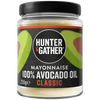We know what you're thinking.
You thought that going on the ketogenic diet meant that you were no longer eating any sugar or enjoying any sweet baked goods. You may even have thought that a ‘keto sweetener’ was an oxymoron. Well, we have good news for you. While the keto diet does severely limit carbohydrate intake and recommends against eating any added refined sugar at all, there are a few ways around the sweet limitations.
Keto sweeteners are sweet substances that have low net carbs, or even zero. While conventional sugar-free sweeteners like Splenda, Equal and Sweet'N Low (which contain sucralose, aspartame and saccharin, respectively) may seem like good choices, they’re not ideal for a healthy keto diet. That’s because they come with their own potentially dangerous side-effects. Aspartame, for example, breaks down into methanol, which can be toxic in large quantities [1].
In this article we'll share what we think are the best keto sweetener options available and give you some tips on how and when to use them.
Why Use a Keto Sweetener?
The keto diet is meant to be more of an ongoing lifestyle change than a temporary fad diet. And the prospects of never eating sweets or dessert again could feel daunting and discouraging for most people. Having the option of an occasional sweet treat can make the difference between maintaining ketosis or fully falling off the wagon and into a sugar binge. As your taste buds change over time after cutting out refined sugars, you may also find that you can taste natural sweetness more easily in berries, vanilla or even coconut, and you can do without any additional sweeteners.
We don't advocate eating keto-friendly sweets every day — but it's nice to at least know you have an option for those moments when you're celebrating, such as a birthday, or when you are commiserating and about to reach for a refined sugar-laden tub of cookie ice cream. Indulging in a delicious keto dessert on a rare occasion can actually help you stay on track for the long haul.
Paleo vs. Keto Sugars

You might imagine that since the paleo and keto diets overlap in many ways, paleo-friendly and keto-friendly sweeteners would be the same. But that's not the case.
Advocates of the paleo diet tend to emphasise natural, unprocessed food over anything else, while advocates of the keto diet are also focused on optimising ketone production, stabilising blood glucose and eating low carbs (<20g per day).
The most popular paleo sweeteners — coconut sugar, blackstrap molasses, agave syrup, raw honey, maple syrup and dates — are not keto-friendly at all. Of these choices, coconut sugar has the lowest glycemic index, but it still contains far too much fructose to work for the keto diet.
While the paleo diet doesn't support going hog-wild on starchy carbohydrates and natural sweeteners, it doesn't overtly restrict it either. By default, most paleo eaters end up following somewhat of a low-carb diet, but low-carb is not a requirement of the diet.
The best keto sweeteners/sugars, while minimally processed, are derived from natural sources, like regular sugar, a fruit or an herb, with no chemical additives. They must have a low carb count, and they must not raise blood glucose levels drastically enough to disrupt ketosis. Paleo experts don't always agree on whether keto sweeteners qualify as paleo, but it's certain that paleo sweeteners don't qualify as keto.
The Best Keto Sweeteners
A good keto-friendly sweetener is low- to no-carb, low- or zero-calorie, as natural as possible and (ideally) sweet without any sort of bitter aftertaste. Everyone is different as far as taste goes — some people taste bitter where others don't, for example — so you'll have to see for yourself which options you like and in what context.
Plant-based sweeteners include stevia (herb), monk fruit (fruit) and yacon syrup (root). Keto-friendly sugar alcohols* include erythritol and xylitol. Let's dig into each one.
*Please note that there are other sugar alcohols that are not keto-friendly. Maltitol, sorbitol and mannitol are all discouraged on the keto diet because they have been shown to raise blood sugar [2].
Stevia
Stevia is a zero-calorie, low-carb sweetener made from a very sweet leafy plant (the stevia plant), which you can actually grow in your own garden at home alongside other herbs if you like. The white stuff you find at the grocery store is a powdered version of the dried herb, processed for consistency and shelf stability.
Stevia is 250-300 times sweeter than regular sugar, so it's not a 1-to-1 substitute in recipes. For every 200 grams of sugar in a recipe, you'll substitute only 4 grams of powdered stevia, making it difficult to bake with — although it is safe to cook with or heat stevia [3]. It comes in liquid or powder form as a pure extract, but you can also find it mixed into commercial sugar replacements like Truvia (which contains a number of other sugar substitutes as well), which can be substituted 1-to-1 in recipes.
Stevia has a bitter after taste to some, while others don't mind it at all. Some brands like NuNaturals boast a non-bitter formula, so shop around to see which brand works best for you, or look for a combination sugar substitute that mixes stevia with the other keto-approved sweeteners on this list.
Monk Fruit Sweetener (Also Called Luo Han Guo)
Monk fruit is a Southeast Asian fruit that's 100-250 times sweeter than table sugar. You can get it in dried form at Asian markets, but more commonly, it's found in powder or liquid form at health food stores online. It’s currently not widely available in stores in the UK for sale, so you'll have the best luck buying online.
Monk fruit is also a zero-calorie option. Rather than deriving its sweetness from fructose like other fruits, monk fruit contains special antioxidants called mogrosides, which give the fruit its distinctive sweetness without the sugar [4].
Monk fruit extract does have a flavour of its own, which some people enjoy and others find unenticing. Some of the most popular monk fruit products are flavoured syrups like maple, chocolate or strawberry. Just watch out for the added ingredients in flavoured monk fruit.
Yacon Syrup

Yacon, a South American tuber, is a root with a sweet syrup inside. Unlike stevia and monk fruit, yacon syrup has about 30 calories per 15-ml serving and is something to keep in mind.
This option is a little bit different from the others, not just because of the calories, but because of its seemingly high carb count. But because so much of the carb content in yacon syrup comes from a fiber called fructooligosaccharides (FOS), those carbs are subtracted out to get net carbs [5].
Even still, the net carb count seems a bit high for a keto food at 7.5 grams per 15mL serving. Interestingly, studies show that yacon syrup can still be beneficial to those looking to lose weight or manage their insulin levels [6][7].
This option is a little less common than the others, but you can find a few brands online. Because of the high fibre of this sweetener, you won't want to cook with it. It's best used to sweeten foods that have already been cooked.
Erythritol
Since erythritol is a sugar alcohol, it actually tastes just like sugar. It looks like sugar too; the texture looks like it's halfway between granulated and powdered sugar.
Sugar alcohols are a class of compounds that provide a sweet flavour without any of the metabolic effects of actual sugar. In fact, studies show that, despite erythritol's 4-gram carb count per 4-gram serving, it may help lower blood sugar in both healthy and diabetic patients. That’s because the carbohydrates in erythritol aren’t digestible in the human gut. For this reason, erythritol is kind of like fibre when it comes to net carbs — there are zero net carbs in a serving of erythritol [8][9].
Erythritol is virtually without side effects, but some people report feeling a bit gassy if they eat too much. Try to stick to under 15 grams per day to avoid any digestive upset. It tastes like sugar, but can sometimes have a cooling effect in your mouth, which some people don't like. Swerve is a brand of erythritol-based sweetener that also contains oligosaccharides, which seem to mitigate the cool feeling slightly and also allows for a 1-to-1 swap with granular table sugar for recipes. You can find Swerve in granulated, powdered, and even brown sugar varieties.
Xylitol
This one is a bit more controversial, due to the commonly reported digestive issues it causes. Although it doesn’t affect everyone the same way, xylitol can cause gas and bloating, so if you have a sensitive digestive system, you might skip this one [10].
Like erythritol, xylitol is a sugar alcohol that's similarly flavoured. Also like erythritol, it contains 4 grams of total carbs and zero net carbs per serving. You'll find xylitol in a number of keto-friendly confections at your local health food store. It's important to note that, unlike anything else on this list (including erythritol), xylitol is highly toxic to dogs. So if you have a furry friend at home, keep your xylitol sweets out of reach.
Keto-Safe Sugar Alternatives

The keto diet is all about the long game. Of course, if your goal is weight loss (excess fat), you want to see results, which is why this diet is such a great place to start your journey. But ultimately, to sustain a keto lifestyle for the long haul, it's important to know that you can indulge in some keto baked goods from time to time.
When it comes to keto sweeteners, you have the option to go with something herbal like stevia, a fruit extract like monk fruit, a syrup like yacon, or sugar alcohols like erythritol or xylitol. There are a number of great brands to choose from, and it’s worth experimenting with a few keto sweeteners to understand what fits best with your lifestyle and taste.
If you're looking for a place to start, try our delicious Gluten-Free Keto Chocolate Cookie Dough Bar recipe, which uses monk fruit sweetener.
You may also find that the natural sweetness of foods like vanilla, berries, coconut and dark chocolate is enough for your newly adapted taste buds and you can skip the keto sweetener completely!
All information provided on our website and within our articles is simply information, opinion, anecdotal thoughts and experiences to provide you with the tools to thrive.
It is not intended to treat or diagnose symptoms and is definitely not intended to be misconstrued for medical advice. We always advise you seek the advice of a trained professional when implementing any changes to your lifestyle and dietary habits.
We do however recommend seeking the services of a trained professional who questions the conventional wisdom to enable you to become the best version of yourself.
REFERENCES
[1] https://www.sciencedirect.com/science/article/pii/S0306987715002443#b0005
[2] https://www.ncbi.nlm.nih.gov/pmc/articles/PMC3286380/
[3] https://www.ncbi.nlm.nih.gov/pmc/articles/PMC4890837/
[4] https://pubmed.ncbi.nlm.nih.gov/21351724/
[5] https://www.ncbi.nlm.nih.gov/pmc/articles/PMC4963912/
[6] https://pubmed.ncbi.nlm.nih.gov/19254816/
[7] https://www.ncbi.nlm.nih.gov/pmc/articles/PMC3671746/
[8] https://www.ncbi.nlm.nih.gov/pubmed/28770335
[9] https://www.ncbi.nlm.nih.gov/pubmed/29361825
[10] https://www.ncbi.nlm.nih.gov/pmc/articles/PMC5093271/
















